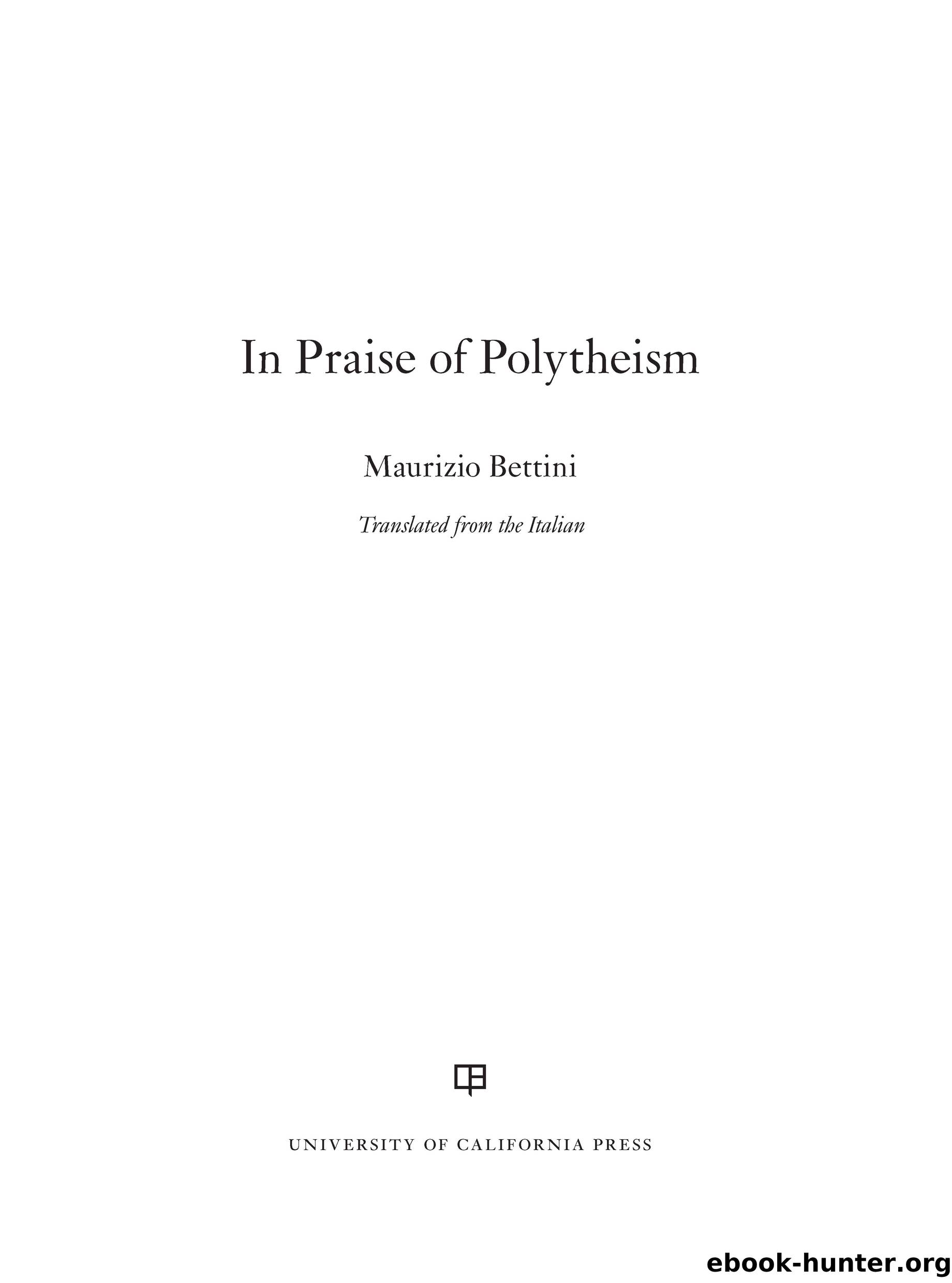In Praise of Polytheism by Maurizio Bettini

Author:Maurizio Bettini
Language: eng
Format: epub
ISBN: 9780520342248
Publisher: University of California Press
This very same Varro testifies that he wrote first concerning human things, but afterwards concerning divine things, because the states (civitates) existed first, and afterward these things were instituted by them. [.â.â.] The following is the reason Varro gives when he confesses that he had written first concerning human things, and afterwards of divine things, because these divine things were instituted by men:ââAs the painter is before the painted tablet, the mason before the edifice, so states (civitates) are before those things which are instituted by states.â12
Augustine did not agree with Varro, and it is not hard to imagine why: âBut the true religion,â he objected, âwas not instituted by any earthly state (civitas).â.â.â. It, however, is inspired and taught by the true God.â In the eyes of someone who belonged to a culture that saw God as the creator of the universe, religion could be nothing less than an absolute prerequisite, and thus the contrary idea that it was men who instituted divine things could be no less than incomprehensible. But, with all due respect to Augustine, Romans had exactly this kind of world view: first come the civitates, then come the res divinae, which are institutions created by the civitates, just like a painting or an edifice is the product of its maker.13
This cultural habitâgod as a function or consequence of the Cityâhelps explain expressions at first glance surprising from a modern perspective (or to a Christian apologist). Take March 14 as an example, the day on which the sacra of Minerva were celebrated. On this day, according to Ovid, it was forbidden to fight and spill blood, because it was Minervaâs birthday14 Did Ovid mean that on March 14 Romans celebrated the birth of Athena from Zeusâ head? Naturally, the answer is neither mythological nor theogonical.15 The day of Minervaâs birth simply corresponded with the day when the temple dedicated to her worship was officially consecrated, the dies natalis templi. For worshippers any given god âwas bornâ on the day of the public ceremony consecrating the temple and authorizing the godâs entrance into the City. Obviously the Christians would later make fun of this aspect of the Roman religion: âIt is the birthday (natalis) of Tellus,â Arnobius would exclaim, âfor the gods are born, and have festal days on which it has been settled that they began to breathe.â16 But this is merely a way to reduce a cultural metaphor to a dull literal meaning, whereas the dies natalis of a god really had a rich ideological content: in Rome, a god âwas bornâ alongside the consecration of his or her temple precisely because a godâs âbeginningâ went hand in hand with its process of public incorporation.
This quite strange (at least for contemporary eyes) conception of the divine is confirmed yet again by Cicero in his dialogue On the Nature of the Gods. In this dialogue we meet Cotta, pontifex maximus and skeptic philosopher. In response to the arguments laid forth by the Stoic Balbus, Cotta says:
Download
This site does not store any files on its server. We only index and link to content provided by other sites. Please contact the content providers to delete copyright contents if any and email us, we'll remove relevant links or contents immediately.
| Baha'i | Cults |
| Demonology & Satanism | Eckankar |
| Egyptian Book of the Dead | Freemasonry |
| Messianic Judaism | Mysticism |
| Scientology | Theism |
| Tribal & Ethnic | Unitarian Universalism |
The Four Agreements by Don Miguel Ruiz(6765)
Breaking Free by Rachel Jeffs(4218)
The Hatha Yoga Pradipika (Translated) by Svatmarama(3342)
120 Days of Sodom by Marquis de Sade(3275)
Member of the Family by Dianne Lake(2352)
The Tao of Physics by Fritjof Capra(2276)
The Psychedelic Gospels: The Secret History of Hallucinogens in Christianity by Jerry B. Brown(2158)
The Road to Jonestown by Jeff Guinn(2066)
Going Clear: Scientology, Hollywood, and the Prison of Belief by Lawrence Wright(1985)
Going Clear by Lawrence Wright(1968)
Uriel's Machine by Christopher Knight(1899)
The Grand Grimoire: The Red Dragon by Author Unknown(1813)
The Gnostic Gospel of St. Thomas by Tau Malachi(1799)
Key to the Sacred Pattern: The Untold Story of Rennes-le-Chateau by Henry Lincoln(1634)
Animal Speak by Ted Andrews(1626)
The Malloreon: Book 02 - King of the Murgos by David Eddings(1596)
Waco by David Thibodeau & Leon Whiteson & Aviva Layton(1560)
The New World Order Book by Nick Redfern(1551)
The Secret History of Freemasonry by Paul Naudon(1503)
